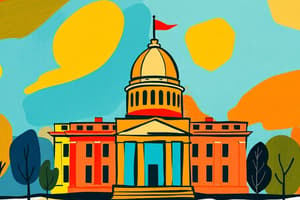Podcast
Questions and Answers
Who is considered the Father of Modern Political Science?
Who is considered the Father of Modern Political Science?
- John Locke
- Thomas Hobbes
- Niccolo Machiavelli (correct)
- Aristotle
Which term refers to a group of people sharing the same history, culture, and language?
Which term refers to a group of people sharing the same history, culture, and language?
- Nation (correct)
- State
- Society
- Government
In which form of government does a monarch represent the state while a prime minister acts as the head of government?
In which form of government does a monarch represent the state while a prime minister acts as the head of government?
- Parliamentary (correct)
- Theocracy
- Monarchy
- Democracy
What is the primary focus of political science?
What is the primary focus of political science?
What is meant by 'sovereignty' in the context of government?
What is meant by 'sovereignty' in the context of government?
What does governance primarily rely on for the well-being of society?
What does governance primarily rely on for the well-being of society?
Which aspect of government refers to the personnel involved?
Which aspect of government refers to the personnel involved?
Globalization is primarily driven by which factors?
Globalization is primarily driven by which factors?
What does internal sovereignty primarily refer to?
What does internal sovereignty primarily refer to?
Which type of power in leadership is based on the compliance due to admiration or identification with an agent?
Which type of power in leadership is based on the compliance due to admiration or identification with an agent?
What element defines the authority of a state to enforce laws over its people?
What element defines the authority of a state to enforce laws over its people?
Which type of conservatism focuses on social and economic policies designed to benefit ordinary people while preserving established institutions?
Which type of conservatism focuses on social and economic policies designed to benefit ordinary people while preserving established institutions?
In what way does liberalism emphasize political equality?
In what way does liberalism emphasize political equality?
How does coercive power influence a person's compliance within a leadership context?
How does coercive power influence a person's compliance within a leadership context?
Which element of state refers to the physical area where a government exercises authority?
Which element of state refers to the physical area where a government exercises authority?
What is a characteristic of liberal conservatism?
What is a characteristic of liberal conservatism?
Study Notes
Politics Overview
- Politics involves human relationships and social interactions.
- Niccolò Machiavelli is recognized as the Father of Modern Political Science.
- Aristotle is known as the Father of Political Science.
- Politics is one of the first organizations created by humans.
Origin of Political Terms
- Polis refers to a city-state that is an independent political society.
- Politiks denotes citizens.
- Politikos means government officials.
Political Science
- The field studies the state and governance mechanisms.
- Political scientists are experts within this discipline.
Government vs. Governance
- Government: Formal institutions and the individuals making political decisions for society.
- Governance: Authority derived from political leaders aimed at societal well-being.
Aspects of Government
- Government Personnel: Refers to individuals within government roles.
- Government Machinery: Comprises government departments, offices, and agencies.
Types of Government Systems
- Democratic: Rule by the people.
- Monarchy: Ruled by a king with hereditary succession.
- Parliamentary: Electing a prime minister while a monarch represents the state.
- Theocracy: Joint governance by church and state.
Nation and State
- Nation: A group of people sharing common characteristics such as history, culture, and language.
- State: A community of nations occupying a specific territory with a government that is obeyed by its inhabitants.
Globalization
- Refers to the interaction and integration of individuals, businesses, and governments across countries, driven by international trade and advancements in information technology.
Sovereignty
- A sovereign government has distinct authority over a defined territory and a monopoly on violence.
- Internal Sovereignty: Control within its jurisdiction.
- External Sovereignty: Autonomy from outside control.
Elements of a State
- People: The community constituting the state.
- Territory: Physical land under the state's control.
- Government: Political agency that administers policies and laws.
- Sovereignty: The state's power to enforce laws over its population.
Power and Leadership
- Power is neutral; its impact depends on usage.
- Reward Power: Compliance for rewards.
- Coercive Power: Compliance to avoid punishment.
- Legitimate Power: Compliance based on recognized authority.
- Expert Power: Compliance due to trust in the agent’s expertise.
- Referent Power: Compliance stemming from admiration or the desire for approval.
Political Ideologies
- Conservatism: Seeks to maintain traditional values and create stability without rapid change.
- Focuses on protecting established norms against modernization.
Types of Conservatism
-
Traditional Conservatism: Emphasizes the protection of cultural norms against liberal changes.
-
One-Nation Conservatism: Advocates for established institutions and programs to benefit the general populace.
-
Liberal Conservatism: Combines conservative and liberal policies, especially in economic and social areas.
-
Liberalism: A political philosophy grounded in individual rights, liberty, political equality, and rule of law.
- Principles of Liberalism:
- Liberty
- Individualism
- Skepticism towards power
- Rule of law
- Equality before the law.
- Principles of Liberalism:
Studying That Suits You
Use AI to generate personalized quizzes and flashcards to suit your learning preferences.
Description
This quiz covers the fundamentals of political science, including key contributors like Machiavelli and Aristotle, as well as essential political terms. Explore the distinctions between government and governance, and understand the role of political scientists in studying state mechanisms.




